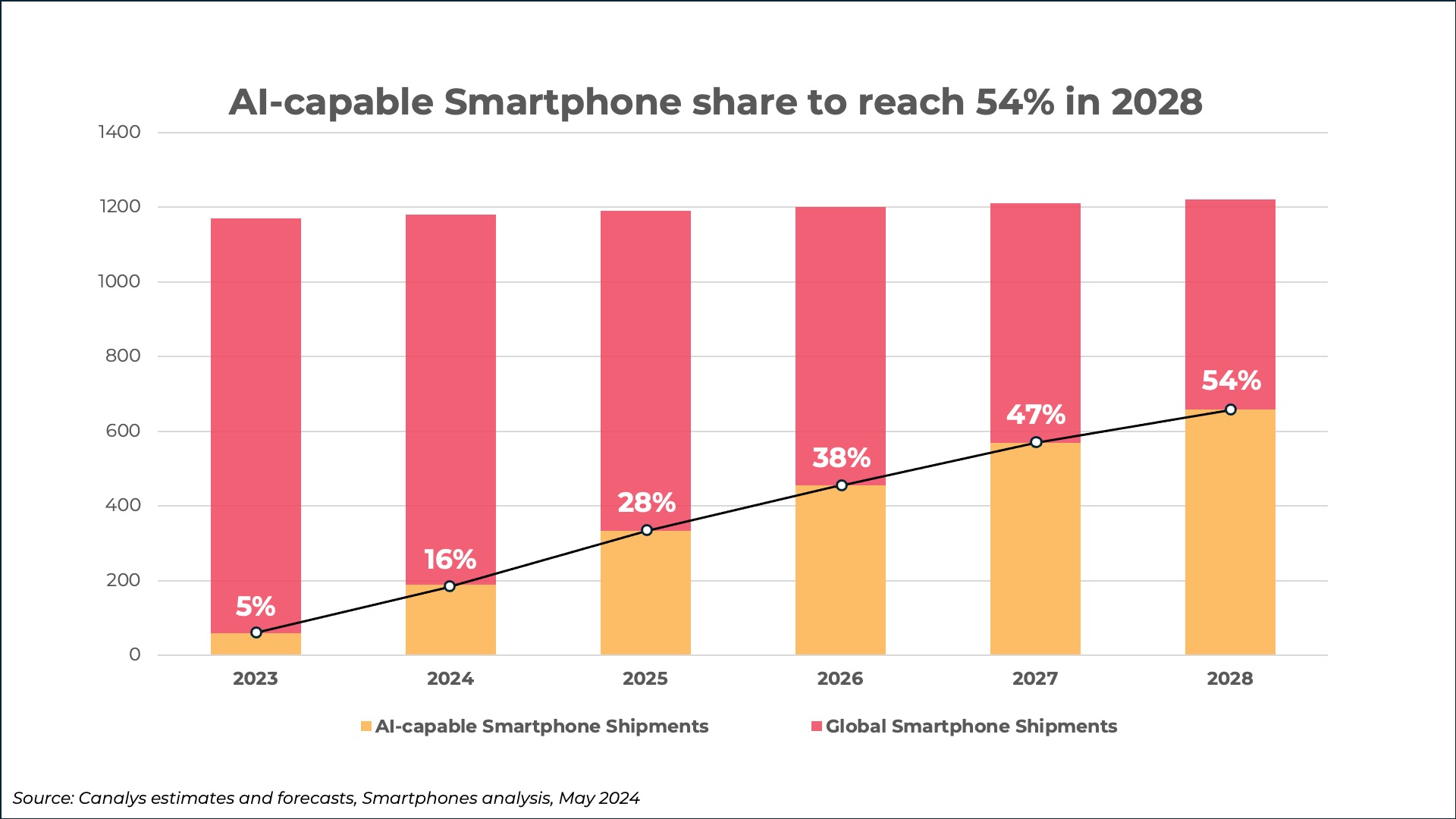The convergence of artificial intelligence (AI) and smartphones will be remembered as one of the most transformative advancements of this era. At VEVE, being a Key Partner to all leading smartphone manufacturers including the likes of Samsung, Apple, Xiaomi, Huawei, OPPO and vivo amongst others provides us with a unique vantage point and insights into the future of the industry.
The potential impact of AI
AI is on the brink of transforming the modern smartphone, potentially changing the way we fundamentally use our devices. So much so, 28% of new smartphones will be generative AI-capable by 2025, driven by rapid advancements in chipset technologies and growing consumer demand. Here are some of the biggest benefits and potential pitfalls of this technological shift.
- AI in Cameras: Enhances scene recognition, low-light performance, and real-time image processing.
- Battery Life Optimization: AI learns user habits to manage power consumption, potentially boosting battery life by up to 30%.[1]
- Processing Speeds: AI-powered chips improve efficiency for complex tasks like augmented reality and gaming.
- Generative AI: 2024 has already seen deep integration of generative AI in flagship models from Samsung, Xiaomi, Oppo, Vivo, ASUS and Honor
- User-Centric Functionalities: On-device generative AI automates tasks, offers smarter communication tools, and enhances personalization

While there are plenty of positives, the integration of AI in smartphones raises significant privacy and data security concerns. As these devices collect and process vast amounts of user data, ensuring that this information is managed securely and ethically is paramount. Manufacturers and developers must implement robust security measures and strictly adhere to privacy regulations to protect user information and maintain user trust.
Here’s how top smartphone manufacturers (OEMs) are accelerating AI adoption across the globe
Apple
Apple has made significant strides in artificial intelligence, embedding advanced AI capabilities into its ecosystem. This includes integrating OpenAI’s ChatGPT with Siri, offering users optional access to advanced conversational AI. Additionally, the new Genmoji feature lets users create custom emojis by simply typing a description, generating personalized options directly.
Tim Cook, Apple’s CEO said ‘Our unique approach combines generative AI with a user’s personal context to deliver truly helpful intelligence. And it can access that information in a completely private and secure way to help users do the things that matter most to them.’
OPPO
OPPO is at the forefront of integrating AI into its smartphone offerings, with the aim of making it accessible to a broader audience. Over the last decade, OPPO has filed more than 5000 patents and about 70% out of those were for AI imaging. OPPO has also deployed LLM with 7 billion parameters on its devices.[2]
Billy Zhang, President of Overseas market, Sales, and Service at OPPO said
‘For the first time in the industry, OPPO is bringing generative AI to all product lines. By the end of this year, we expect to bring generative AI features to about 50 million users.’
vivo
vivo has introduced features like the AI Note Assist which generates clear layouts, extracts key details, and creates to-do lists automatically. The new AI Screen Translation translates content on the page without switching apps while the AI Transcript Assist converts recordings to text quickly, simplifying the process of accessing and analysing meeting information.
Vikas Tagra, Head of Product Management @ vivo India said
‘We are very vigilant about consumers’ needs and the technology trends. This is just the first generation of AI’ we will see how it evolves.’
Xiaomi
Xiaomi emphasizes “human subjectivity,” focussed on UX-driven AI technologies, like Xiaomi’s ‘AI Portrait’ feature on the Xiaomi 14 and 14 Ultra allows users to train the phone’s AI with their photos, generating realistic AI selfies in various settings based on text prompts.
Lei Jun, Founder and CEO of Xiaomi spoke about AI being the ‘new benchmark’ in smartphones and being the ‘driving force behind innovation’
Samsung
Samsung’s Galaxy AI has brought advanced AI to their smartphones, offering features like AI-driven voice control and live translation during calls and messages. Galaxy AI, powered by Google Cloud’s Gemini Large Language Model (LLM), enhances Samsung phones by making them more intuitive and user-friendly.
Jamie Park, VP & Head of Experience Marketing Group, Mobile Experience Business at Samsung Electronics said
‘As Samsung continues to evolve Galaxy AI and take it one step further, we’re committed to delivering unique and optimized Galaxy AI experiences to best suit each form factor, from the newest Galaxy Z series to the broader Galaxy ecosystem.’
While the potential and use cases of AI are unimaginable, OEM manufacturers and researchers need to tread carefully. AI is only efficient when its trained right. The algorithms can lead to biased outcomes if the data lacks diversity and is factually incorrect. Thus, diverse training sets and constant evaluation of these systems will be necessary. The concerns of privacy and data security also remain critical making safeguarding user information while unlocking AI’s potential.
So, whether you’re snapping photos, optimizing battery life, or chatting with your phone (or with a bot), remember—the future will (most likely) be AI-powered.
Keen to explore new opportunities with VEVE? Fill the form below to get started!






